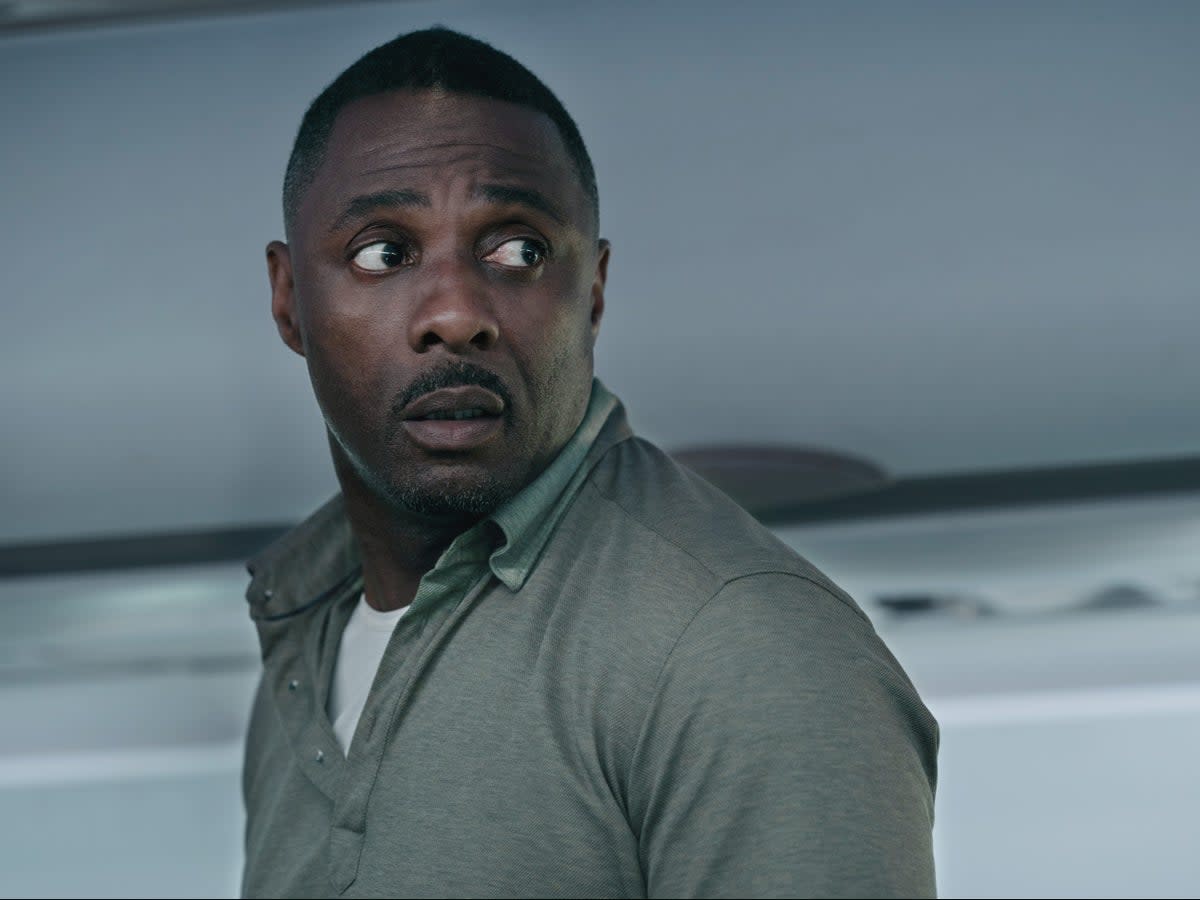Hijack: The nail-biting Idris Elba plane thriller that’s flying under the radar

It’s summer. The sun is shining, barbecues are burning and picnics are packed. Naturally, you don’t want to be stuck inside, watching the telly. And yet there is one show that is keeping curtains drawn and bums on sofas. Hijack, Apple TV+’s new seven-part plane thriller, may have achieved lift-off without much fanfare, but it has now reached cruising altitude and is set to become the hit of the summer.
The premise is simple: Idris Elba is Sam Nelson, an ordinary man on an ordinary flight from Dubai to London. Passengers must contend with all the normal frustrations of long-haul flying, from children playing noisy games consoles to queues for the loos. Everything changes, however, when a group of armed criminals perform the hijack. They now have seven hours until the plane is due to land at Heathrow; meaning Sam has seven hours to unravel the mysterious events and save the passengers from fiery oblivion. Back in London, Sam’s ex-wife Marsha (Christine Adams) says ominous things such as “Sam’s the best at handling it”. “Handling what?” her new man (Max Beesley) replies, for the benefit of the audience. “The negotiation,” Sam’s teenage son Kai (Jude Cudjoe) answers, cryptically. So viewers get a hint that Sam has a very particular set of skills, and is quite capable of entering Taken mode.
In Elba’s Sam, Hijack has its Mary Sue – the trope of infallibility that dogs action franchises – but when the stakes are this high, that plot armour is necessary. Elba does some of the finest eye-acting seen on TV: his pupils darting around the cabin, communicating to viewers, if not his fellow passengers, where his interests lie. And there’s something almost erotic about the calm confidence with which he goes toe-to-toe with Neil Maskell’s Stone Island hijacker (Maskell, too, is superb, projecting an eerie competence as an East End villain). Sam is an old-school action hero, mixing the serenity of Ethan Hunt with the ingenuity of John McClane, and throwing in a soppy romantic sensibility. “For a lucky lady?” a stewardess asks when she sees Sam inspecting a necklace. “Other way round,” he responds. “From a lucky man.”
When Lost – JJ Abrams’ series about a group of survivors stranded on a desert island – premiered to hit ratings in 2004, Michael Eisner, the CEO of ABC’s parent company Disney, was said to have prophesied the show would be a flop because not every episode could be a plane crash. Well, Hijack is a neat circumvention of the Eisner principle: every episode comes with the threat of disaster. And yet, while plausibility is stretched, it’s never broken. Questions like “would the hijackers really bring live rounds on to a pressurised aircraft?”, which dominate Reddit discussions of movies like Air Force One and Con Air, become plot points. The pacing, while rapid, feels like it is remaining in a low gear, ready to apply the throttle when the finale approaches.
But the thing that is turning Hijack into a stealth phenomenon – flying under the radar, you might say – is the way it unfolds in real-time. From take-off to landing, Dubai to Heathrow is a seven-hour flight, and Hijack has seven hour-long episodes. Indeed, the real trauma of Hijack is that Apple are distributing new episodes at intervals of a week (a length of time in which I could fly to Dubai and back 12 times). “Do we seriously have to wait a full week for Hijack ep four?” one fan tweeted immediately after the show’s third episode aired. “Who invented this ‘weekly episode’ nonsense??” another replied. The linearity of the broadcast schedule, combined with the slow unfurling of the plot, is creating a fever among viewers.
Of course, the real-time concept isn’t new. When Kiefer Sutherland first appeared on American TV screens in 2001 as Jack Bauer, the hard-as-nails protagonist of 24, critics and audiences were enraptured. “Innovative and expertly executed,” wrote Variety, of the show’s countdown premise. Each season, set over the course of an extremely long day, featured a race-against-time element, and a digital display warning viewers how few hours Bauer had left. But 24 was hardly the first show to adopt this premise: a sterling example is “Life Time”, the 1979 episode of M*A*S*H in which a wounded soldier needs an arterial graft within 20 minutes, and a clock in the corner of the screen reminded viewers how quickly time passes. These are the antecedents, but Hijack is the modern apotheosis: smart, simple and slick.
So why doesn’t it feel like Hijack is a huge hit? Well, the answer is pretty simple: you probably don’t have Apple TV+. An estimated 1.91 million UK homes currently have an Apple TV+ subscription, compared to 7.4 million on Disney+, 12.9 million getting Amazon Prime and 16.96 million receiving Netflix (not to mention BBC and ITV). For all that critics might venerate shows such as Severance, and for all that audiences might develop a cult-like reverence for Ted Lasso, Apple simply doesn’t have the cut through to make their shows appointment viewing. Yet.
Hijack feels like it has the potential to be a watershed moment for the Cupertino-based company – no mean feat given that Apple TV has already won a Best Picture Oscar for Coda. But for all the acclaim that film received from Academy voters (if not, especially from critics), it remained on the periphery of mainstream audiences. Hijack could well end up being Apple’s Squid Game. It has all the hallmarks of true event TV: a slow-burn mystery waiting to be solved, a ticking-clock scenario, a hero you’d trust with your life, and an agonising week-long wait for new episodes. When the plane lands (or doesn’t) in a few weeks’ time, you’ll want to be onboard.
Hijack episodes drop weekly on Wednesdays on Apple TV+

 Yahoo News
Yahoo News 
